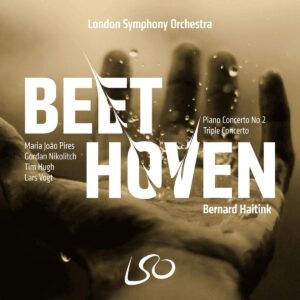Maria João Pires is a treasure, no question, and in Beethoven’s high-classical Second piano concerto it’s great to hear her make the most of what could be considered the weakest link of Beethoven’s set of five. What works in her favor is that Pires achieves sweetness not by adding treacle but through intensely subtle naturalness. Her playing never calls attention to itself outright and yet it’s tempting to zoom in on details like her left hand’s mezzo-piano staccato notes: as vibrant in attack as possible, and yet perfectly gentle in volume.
When she tingled around the circuit with that concerto, I found her first-movement cadenza labored (BRSO/Stenz); two years later, when the concert recorded on this disc took place, there are no such qualms left. Unfortunately, the re-entry of the orchestra isn’t clean here, although it doesn’t amount to an interpretation-debilitating boomer. On the mildest of downsides, the frivolously coy opening of the third movement no longer sounds “as happy as a boy on Christmas looks, with his first electric train set before him”. Perhaps something like that is more easily communicated in concert than on disc.
Well played, musical, and sensitive though this is—easily two notches above average—it’s also not outrageously great or particularly outstanding. It pleases. I should have liked to be there in concert. But if I didn’t have this in my collection of Beethoven piano concertos, I wouldn’t miss it. That’s not to say that I shouldn’t like to have a complete such cycle with her, preferably with someone like Chailly or Honeck conducting.
The Triple Concerto that is also on this disc is the same that has been issued together with the single disc of the Seventh symphony in the Haitink cycle. It remains, to quote David Hurwitz from his review of that earlier release, “the dullest large orchestral work” and the soloists haven’t gotten better since the initial release in 2006. Lars Vogt is still excellent, but Hurwitz described “cellist Tim Hugh [as] simply annoying, fussy and mannered, nowhere more so than in the way he launches the finale”; and what I hear of violinist Gordan Nikolitch I like even less than what we heard earlier described with a single laconic “good”. It’s not really that good; a mix of nervously over-accentuated, uneasy, and old-fashioned, and with a grating, ungenerous tone: thin but insistent. The mix of all these “sins”, none particularly overt, does not make for particularly pleasant listening.
The Triple Concerto can be salvaged—just! But it needs a hell of a performance: Like Zinman, Bronfman, Shaham, Mørk (Arte Nova) for example. This is not that performance, and stand-alone it wouldn’t receive a generous rating. Lucky for the CD: the Pires-experience lifts the whole boat. The sound is LSO stereotypical “Barbican-Dry” which is almost never great or impressive (there are exceptions), but it also doesn’t bother me anymore.
































